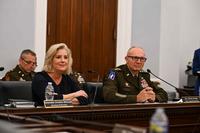A change to the Army's loan program seeks to keep young soldiers away from payday lenders by making it easier for them to access emergency cash, the service's top enlisted officer said this week.
The change, which will go into effect Sept. 9, removes a rule requiring soldiers in the enlisted ranks of E-1 to E-4 to get approval from their commander or first sergeant before requesting a loan through the Army Emergency Relief (AER) program.
Under the new policy, any enlisted soldier who has served at least a year, completed basic and advanced individual training (AIT), and isn't listed as a high financial risk can apply directly to AER for a loan.
"Many soldiers, particularly those in the grades of E-1 through E-4 are reluctant to seek aid from Army Emergency Relief," Sgt. Maj. of the Army Daniel Dailey wrote to senior enlisted leaders via an email recently obtained by Military.com. "Often this is because of an undue negative stigma associated with asking for financial help as well as the perceived, intimidating review process involving unit leaders."
He added, "I am in full support of this policy change and I expect all leaders to embrace it to help rid our ranks of the undue negative stigma associated with seeking assistance through AER."
Payday lenders often open shop directly outside military bases, creating a convenient way for service members to receive quick loans. But those loans frequently come with very high interest rates, sometimes above 300 percent, according to a 2014 report from the Consumer Financial Protection Bureau. Many of them send troops into a spiral of debt.
"The whole idea is to make assistance more available to soldiers and their families," said Guy Shields, an AER spokesman. "We think this is the right thing to do."
The change was approved in July by AER's board of 20 managers, including Dailey.
AER provides soldiers with interest-free loans or grants on a case-by-case basis for needs such as emergency travel, food, utilities, rent or medical expenses. Applicants fill out a request form and provide documentation showing their needs. There is no loan dollar cap, though soldiers are limited to two AER loans per year without command approval. Troops, regardless of rank, can also go through their commander for an immediate loan approval of up to $1,500.
Loans are generally repaid by paycheck allotment, which cannot be turned off by the soldier. Soldiers who refuse to repay may be disciplined by their chain of command.
Under the new policy AER employees will have the discretion to require commander or first sergeant approval for a new loan if they determine the soldier is high financial risk, Shields said. Soldiers will also continue to be referred by loan officers to financial counseling from Army Community Services when appropriate, he said.
Army family supporters welcomed the change.
"We feel that anything is better than a high interest loan," said Amanda Anderson, a spokesman for the Association of the United States Army. "It's great that AER is offering this to families so they have somewhere else to turn instead of going to those places. Junior enlisted members don't always have the savings when an emergency comes up. It's great that a trusted organization like AER can step-up and help them out."
In 2014, AER distributed over $57 million in loans and almost $16 million in grants and scholarships. That year, soldiers at Fort Hood, Texas, received over $5.3 million in loans and grants -- more assistance than troops at any other base.
AER is funded through donations, often contributed through soldier paycheck allotments. In 2014, AER receive $9.7 million in donations, while about $53.6 million in loans were repaid by soldiers.
A previous version of this story incorrectly reported how loan repayments can be collected. Unlike other government debts, AER loans are not referred to the IRS.
-- Amy Bushatz can be reached at amy.bushatz@military.com.


























